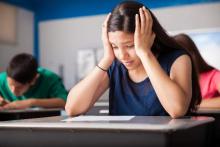A concussion can affect a child’s or teen’s ability to focus at school and keep up with schoolwork, according to a recent study.
Concerns about keeping up with grades and concentrating on work mean that those who have had a concussion may require accommodations until their symptoms have fully subsided, Danielle Ransom, Psy.D., of the George Washington University, Washington, and her associates reported online (Pediatrics 2015 May 11 [doi:10.1542/peds.2014-3434].
“The high level of concern about post-injury school performance implies the need to deliver early reassurance to students and families that their academic needs will be met,” Dr. Ransom and her team wrote. “Furthermore, the range of reported post-injury school problems (e.g., increased time spent on homework, headaches interfering with learning) suggests the need to provide actively symptomatic students with targeted supports during the post-injury recovery period.”
Among 349 youths, aged 5-18 years, who were undergoing evaluation and neurocognitive assessments within 28 days of concussion, 240 remained symptomatic or had impaired performance on testing while 109 had recovered from their concussion (had no elevation of symptoms and no impairments on neurocognitive tests). The researchers gave questionnaires about academic concerns to 239 student-parent pairs and 110 parents of students. The questions asked about concern over how the concussion affected the student’s school learning or grades and new or worsening academic problems since the concussion.
More of the students (59%) and parents (64%) from the unrecovered group had higher levels of concern about school than the students (16%) and parents (30%) in the recovered group. Concerns were highest among older children. Among those not yet recovered, 67% of high school students, 52% of middle school students, and 38% of elementary school students reported feeling moderately or very concerned about the concussion’s effect on their schoolwork.
In addition, 88% of unrecovered students reported having at least one problem at school as a result of symptoms such as headaches, fatigue, or concentration difficulty, compared with 38% of recovered students. Further, 77% of unrecovered students and 44% of recovered students said that they had trouble taking notes, were spending more time on homework, had difficulty studying, or had other problems with academic skills.
“Adverse postinjury academic effects (e.g., failure to complete schoolwork, problems keeping pace with an expanding workload, perception of poorly controlled symptoms) with no supports may be linked to the onset of depression and anxiety,” Dr. Ransom and her associates said.
The study did not receive external funding, and Dr. Ransom and her associates reported no relevant financial disclosures.

